- Paper Sun/Giving To You (Island WIP 6002) 1967 (5)
- Hole In My Shoe/Smiling Phases (Island WIP 6017) 1967 (2)
- Here We Go Round The Mulberry Bush/Coloured Rain (Island WIP 6025) 1967 (8)
- No Face, No Name, No Number/Roamin' In The Gloamin' (Island WIP 6030) 1968 (40)
- Feelin' Alright/Withering Tree (Island WIP 6041) 1968
- Medicated Goo/Shanghai Noodle Factory (Island WIP 6050) 1968
- Mr. Fantasy (Island ILP 961/ILPS 9061) 1967 (8)
- Traffic (Island ILPS 9081) 1968 (9)
- Last Exit (Island ILPS 9097) 1969
- John Barleycorn Must Die (Island ILPS 9116) 1970 (11)
Traffic
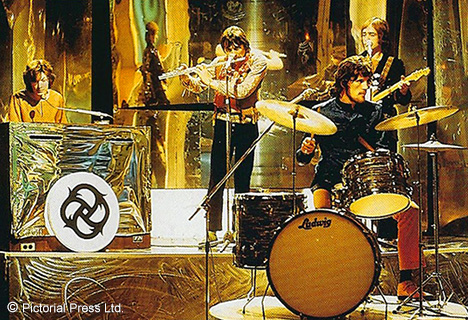
BIRMINGHAM
Revised October 2019
Jim Capaldi drums, percussion, vocals
Dave Mason guitar, bass, sitar, mellotron, harmonica, vocals (left 1968)
Steve Winwood keyboards, guitar, bass, vocals
Chris Wood flute, saxophone, keyboards, vocals
Ric Grech bass guitar (joined 1970, left 1972)
Jim Gordon drums (joined 1971, left 1972)
Rebop Kwaku Baah percussion (joined 1971)
Roger Hawkins drums (joined 1972)
David Hood bass guitar (joined 1972)
"Dear Mister Fantasy play us a tune,
something to make us all happy"
This multi-talented and influential West Midlands group gained international success in the late 1960s and early 1970s, particularly in the USA where they attracted a large following. In Britain, they are remembered mostly for some memorable and ground-breaking singles and albums that scored high chart placings.




Traffic was formed when young Steve Winwood (then still popularly known as "Stevie"), who was the focal point of the successful chart-topping Spencer Davis Group, decided to move beyond the restrictions of that group and form his own band consisting of other Birmingham area musicians.
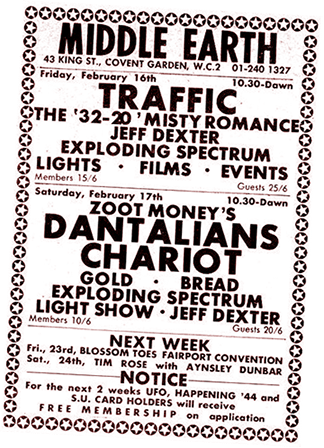
Jim Capaldi and Dave Mason had played together in a Worcester beat group known as 'The Hellions' during the early 1960s and they made a few singles that were issued on the Piccadilly Records label. Jim Capaldi had continued with The Hellions who were re-named Deep Feeling after Dave Mason's departure and to help pay the rent, Dave worked as a roadie for the Spencer Davis Group.
Art student and flute/saxophone player Chris Wood was born in Harborne, Birmingham on 24 June 1944. He grew up living at Corngreaves Hall in Cradley Heath along with his sister Stephanie who later made stage clothes for the Spencer Davis Group. Chris had been a member of Jim Simpson's jazz-styled band Locomotive and previous to that, had played in "Sounds Of Blue" who later became Chicken Shack and included Christine McVie (later of Fleetwood Mac) in their line-up.
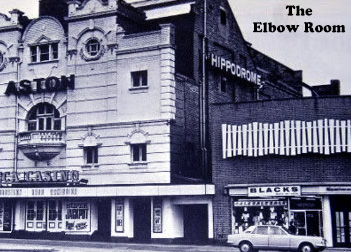
The four musicians would get together for improvised jamming on stage at a hip club called "The Elbow Room" on Aston High Street next door to the old Hippodrome theatre in Birmingham. It was there where the idea for Traffic was formed. Steve Winwood recalled; "We all used to go to this drinking/gambling club where Jim used to play, and like we used to get up and play with him and jam. And we just got together."
With Dave Mason and Jim Capaldi eager to form a new band with Steve Winwood, Chris Wood also agreed to join the partnership. Dave Mason later admitted; "Everyone realized that we were going to get a certain amount of success because Steve was in the band."
"We lived on cheese sandwiches and tins of rice pudding"

The group retreated to an isolated (and reportedly haunted) cottage in Aston Tirrold, Berkshire in order to write and rehearse new material. "We lived on cheese sandwiches and tins of rice pudding" said Steve. The Traffic cottage was to become a place of legend as regular visitors included famous musicians such as Eric Burdon, Pete Townshend and Eric Clapton as well as Trevor Burton (of The Move) amongst many others.
The new line-up was named "Traffic", an action that prompted an obscure south London band called "Traffic Jam" to re-name themselves "Status Quo". Reportedly, it was Jim Capaldi who came up with the name Traffic after an evening watching cars clog the street following a show at the movie theatre. The band was given full financial backing by Island Records boss Chris Blackwell who intended to promote them to help the launch of Island Records as a major act label.
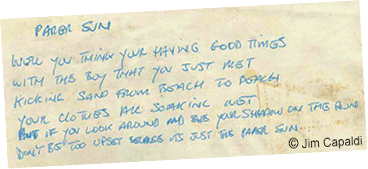
With the publicity surrounding Steve Winwood's involvement, the new group was assured at least initial success. Traffic's first single titled 'Paper Sun' and credited to all four members was released in the summer of 1967.
With production by Jimmy Miller and composed by Steve Winwood with Jim Capaldi supplying the captivating lyrics, the song was just right for the times and featured an Indian sitar played prominently by Dave Mason. The single reached Number 5 in the charts and brought the group to the forefront of the British psychedelic or "flower power" movement that was sweeping the country at the time.
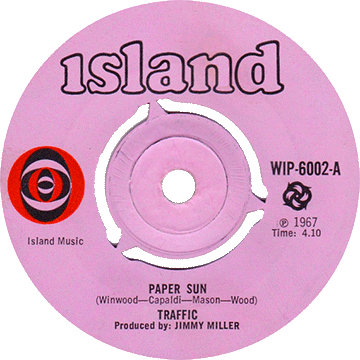
The next Traffic single was even more adventurous and was composed and sung by Dave Mason. The song was supposedly inspired by a dream Dave had at the cottage (although certain substances he was taking may have also played a part) and the recording featured Steve's innovative use of the Mellotron. Dave again played Indian sitar on this track that also included a spoken word segment by six year old Francine Heimann who was the step daughter of Chris Blackwell.
'Hole In My Shoe' became one of the most memorable songs of the 1960s U.K. psychedelic era and captured the atmosphere of 1967 with similar impact as The Pink Floyd's 'See Emily Play'. The single also established Dave Mason as a major songwriting talent with the record reaching Number 3 in the British charts. Years later, a version of Hole In My Shoe was recorded by Neil from the hit BBC TV comedy show "The Young Ones" with the song again making the top ten.
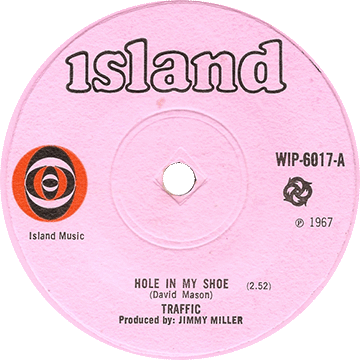
Dave Mason was surprised by the record's success. When interviewed at the time by journalist Keith Altham he said; "My music is an extension of myself. The same applies to the rest of Traffic." Years later, he recalled; "The only reason I started writing songs was because I didn't want to ride on Steve's back!"
By November 1967, a third Traffic single entitled 'Here We Go Round The Mulberry Bush' had been released and was used as the title track of a British teen sex/comedy film based on a Hunter Davies novel. The soundtrack also included songs recorded by Steve Winwood's previous band The Spencer Davis Group. Traffic were to have appeared in The Beatles "Magical Mystery Tour" film performing 'Here We Go Round The Mulberry Bush', but this footage was cut from the final version.
Traffic's live shows at this time included a lot of on-stage jamming and extended solos by the individual members - something quite unusual in Britain for a pop group in those days and an indication of things to come. Jim Capaldi would later describe their performances as "organized chaos".
December of 1967 saw the release of Traffic's acclaimed first album entitled "Mr Fantasy" that showcased the individual talents of the members and proved that Dave Mason, Jim Capaldi and Chris Wood were more than just a backing band for Steve Winwood. The album's title track composed by Winwood and Capaldi became a standard covered by countless other bands to this day.
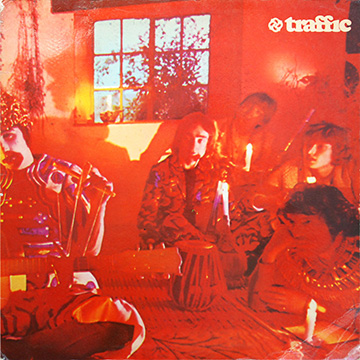
This LP also showed Dave Mason writing as a separate entity and indicated a clash of songwriting styles with his melodic and commercial compositions contrasting alongside the more progressive jazz-influenced songs of the other group members.
Possibly spurred by the success of Hole In My Shoe, Dave Mason left the group in December, supposedly to begin a solo career. He recorded a single titled 'Little Woman' with instrumental backing from the group 'Family' whose debut LP "Music In A Dolls House" had been produced by Dave.
Steve Winwood said at the time; "When Dave left, we lost a limb but we gained freedom... spontaneity. With four people it's harder to be free than with three. We had to drop some tunes and add others but I believe we've got it together now." Following a holiday in Greece, Dave Mason re-joined the Traffic line-up in May of 1968.
Traffic then recorded another successful self-titled album, to which Dave Mason contributed the classic song 'Feelin' Alright', a composition that was to become much covered by other artists. Steve Winwood, Dave Mason, and Chris Wood also participated in the recording of the influential Jimi Hendrix Experience album "Electric Ladyland" in addition to playing on former Deep Feeling guitarist Gordon Jackson's ill-fated solo album.
"A song has a mood, but it has to be strengthened by what goes on around it"
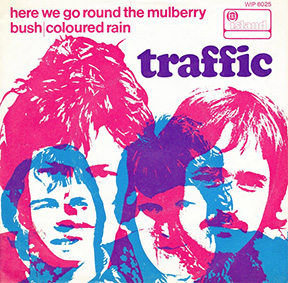
Rolling Stone magazine interviewed Traffic at their cottage late in 1968 and the group spoke about their songwriting. Jim Capaldi; "We all get a feeling of something. I can't explain that feeling in words, it would be a color, like in painting. In 'Coloured Rain', I wrote the words and then Stevie did something to them."
"Without saying or doing anything, without any sort of usual communication, we found just the sound that it should have had. It happens when two feelings come together and they do something together and they compliment each other." Chris Wood said; "Everything has a mood. A song has a mood, but it has to be strengthened by what goes on around it."
Despite well received touring of the UK, Europe and the USA, Dave Mason left Traffic again in October of 1968 leaving the others to continue their concert commitments as a trio. A few months later, an exhausted Steve Winwood (then still only 20 years old) also decided to leave.
Fearing the worst, Island Records issued a 'new' Traffic album titled "Last Exit" made up of leftover recordings, B-sides, and some assorted live material. A compilation LP entitled "The Best Of Traffic" was also released by the label.
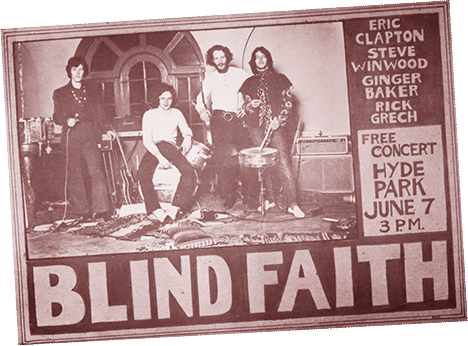
Meanwhile, Steve Winwood re-energized following a few months break, teamed up with legendary guitarist Eric Clapton and drummer Ginger Baker (of the recently disbanded "Cream") and along with bass player Ric Grech (of "Family"), formed the much publicized and short lived "supergroup" Blind Faith.
Dave Mason re-joined Jim Capaldi and Chris Wood who then enlisted keyboardist Mick Weaver to form a line-up called "Mason, Capaldi, Wood & Frog". Dave Mason said; "We want to play some other people's numbers, B.B. King and things, not to stick to things we've written ourselves. We want to go out onstage and have a happy time!"
This group performed in Birmingham in January 1969 and opened for Jimi Hendrix at The Royal Albert Hall to good reviews the following month. They later became known as "Wooden Frog" but following an aborted recording session, Chris Blackwell decided not to support them without Steve Winwood's involvement and they split by March 1969.
After the demise of Blind Faith, Steve Winwood temporarily joined Ginger Baker's new band called "Air Force" who along with Ric Grech and Chris Wood had also included Birmingham musicians Trevor Burton (see The Move) and former Moody Blues front-man Denny Laine. While Air Force may have been another supergroup, they couldn't repeat the success of Blind Faith and disintegrated when Ginger Baker's herion addiction got the better of him.
"We'd like to get back to concentrating on live gigs as soon as possible"
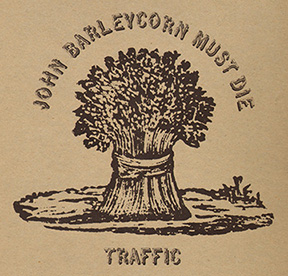
In January 1970, Steve Winwood started work on a long-awaited solo album and was later joined in the recording studio by Jim Capaldi and Chris Wood. The resulting sessions were so successful that Traffic was re-formed minus Dave Mason and the album produced from the recordings entitled "John Barleycorn Must Die" was issued as a group effort. The title track was their own arrangement of a traditional English folk song introduced to the band by Chris Wood. The album was critically acclaimed and became a big seller.
Steve Winwood said; "We had started recording and I asked Jim and Chris if they'd like to help. We did a couple of sessions together, had a good time, got to talking about things and mutually decided that Traffic ought to be given another chance. We'd like to get back to concentrating on live gigs as soon as possible."
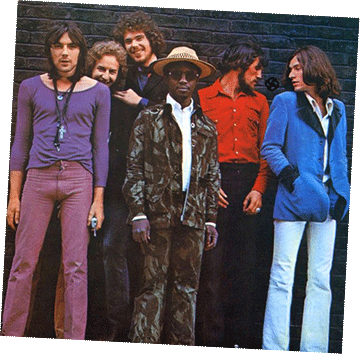
After enlisting top session players to the line-up including bassist Ric Grech from Blind Faith, drummer Jim Gordon of Derek and The Dominos, and Ghanian percussionist Rebop Kwaku Baah, Traffic toured both the UK and the USA where their live recording of 'Gimme Some Loving' (originally recorded by Steve Winwood's old band The Spencer Davis Group) made the charts. Dave Mason joined Traffic on-stage for some of these performances that were issued as part of a live album titled "Welcome To The Canteen".
Dave Mason; "Ever since Traffic began four years ago, we've tried to do things fresh. That's why I play with a lot of people. I like the instant thing that comes from starting something, the magic, the little buzz, you know. It's good. I must go and develop me as myself, and have it accepted for whatever it's accepted for. I hope it won't be Dave Mason ex-Traffic."
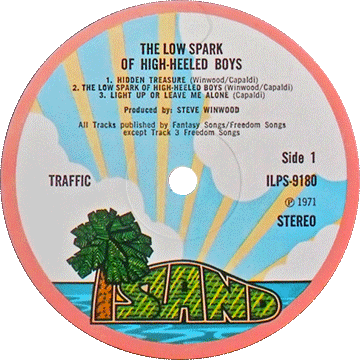
Further Traffic albums were recorded in the 1970s ("The Low Spark of High Heeled Boys"; "Shoot Out at The Fantasy Factory"; "When The Eagle Flies") and were big sellers, particularly in America where the group had a large following.
Ric Grech and Jim Gordon left to be replaced by the famous American "Muscle Shoals" rhythm section of Roger Hawkins (drums) and David Hood (bass). An excellent high-quality video exists of this Traffic line-up performing at the Santa Monica Civic Auditorium in 1972.
Despite a successful Traffic world tour and live album, Hawkins, Hood, and Kwaku Baah left the line-up and Rosko Gee joined on bass guitar. During more touring of the USA in 1974, Steve Winwood became ill resulting in cancellation of further shows and the band decided to take an extended break to work on solo projects. It was the last time Steve, Jim, and Chris played together as a group.
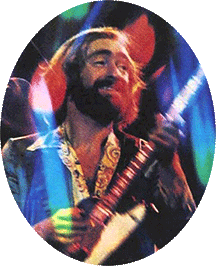
Dave Mason had moved permanently to the USA by the early 1970s and established a successful career there. Along with making best selling albums, he recorded with "The Mamas & The Papas" singer Cass Elliot, Graham Nash, and Fleetwood Mac plus many other well-known names. Despite battles with drugs and alcohol, he scored a big US hit single in 1977 with the song 'We Just Disagree'. Dave continues to record and tour in America although he remains almost unknown in his native Britain where he's remembered mainly for his contributions as part of Traffic. To see an interview with Dave Mason, click HERE.
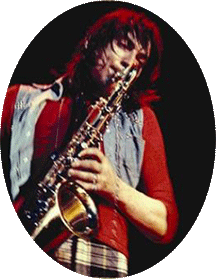
Chris Wood unfortunately developed a reliance on alcohol and drugs which may have later contributed to liver disease. Although outwardly jovial, he was to suffer from depression after the tragic death of his young wife and other close friends. On July 12, 1983 following emergency admittance to a Birmingham hospital, Chris Wood died from pneumonia at the age of only 39. He had recorded tracks for an unfinished solo album that was eventually issued posthumously more than 20 years after his death.
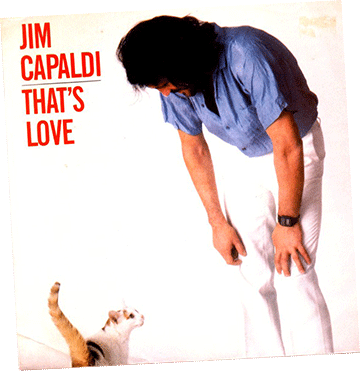
Jim Capaldi recorded his first solo album titled "Oh How We Danced" issued in 1972, and scored a top five hit in Britain in October of 1975 with a cover of The Everly Brothers 'Love Hurts'. He has appeared on recordings by many other well known performers and has made several best-selling albums. His 1983 hit record titled 'That's Love' was recorded with Steve Winwood.
Jim continued to collaborate occasionally with his former bandmate which included a partial Traffic re-union album and tour in 1994. He performed along with many other famous participants at George Harrison's tribute concert at The Royal Albert Hall in 2002. Jim Capaldi passed away on January 28, 2005 after a battle with cancer (see Brumbeat feature Jim Capaldi 1944-2005).
"I'm a great believer in doing mindless physical things for relaxation"
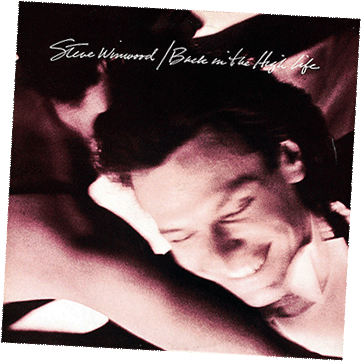
Steve Winwood worked with other well known musicians throughout the 1970s including another supergroup called "GO" (with Stomu Yamashta, Michael Shrieve, and Al Di Meola) before embarking on a predictably successful solo career. His 1986 album titled "Back In The High Life" received a Grammy Award for Album of the Year in the USA while hit singles such as 'While You See A Chance' along with 'Valerie' and 'Higher Love' have scored high chart placings in many countries.
Although Steve Winwood has not enjoyed such a high profile in recent years, he remains a major talent on the world music scene. Along with touring around the world in support of his own albums, he continues to collaborate with other famous musicians.
Steve notably performed with Eric Clapton in 2008 for a series of critically acclaimed concerts at New York's legendary Madison Square Garden venue that featured "Blind Faith" songs along with many other classics from their long music careers.
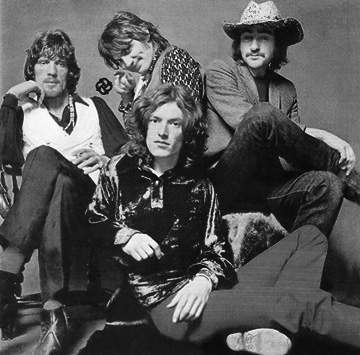
Steve Winwood continues to record and perform today in between spending time at his farm in Oxfordshire where he built a music recording studio for his own use. He said; "There are always jobs to be done on the farm and I'm a great believer in doing mindless physical things for relaxation. When I'm not in the studio I like to get out in the fresh air and dig a hole or something. Moving bales or fencing or logging. There's always work to be done because I don't employ enough people to do it!"
Perhaps Traffic's greatest achievement was their successful integration of third-world rhythms with western rock, folk, and jazz that made them true pioneers of what became known as "World Music". Traffic were inducted into the famous "Rock And Roll Hall Of Fame" in 2004.
Copyright © John R Woodhouse
Sources: 'The Harmony Illustrated Encyclopedia of Rock' 1982; 'Back In The High Life - a biography of Steve Winwood' by Alan Clayson 1988; Rolling Stone Magazine' interviews published in 1968 and 1969; 'Record Collector Magazine' and 'Midland Beat' various issues.
A book from Genesis Publications titled 'Mr Fantasy - The Lyrics of Jim Capaldi' is available in high-quality format. For more information about this book on the life of Jim Capaldi, visit the Genesis Publications web site at: www.genesis-publications.com/book/mr-fantasy/deluxe
Traffic 1960s Record Releases
(highest UK chart position in brackets)
Singles:
Albums:
To read an interview with Dave Mason, click HERE
Some official Traffic related websites are listed below:
Jim Capaldi: www.jimcapaldi.com
Dave Mason: www.davemasonmusic.com
Steve Winwood: www.stevewinwood.com
Chris Wood: https://www.facebook.com/ChrisWoodTraffic
If you would like to contribute to this page, please e-mail john@brumbeat.net